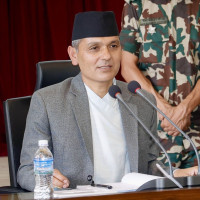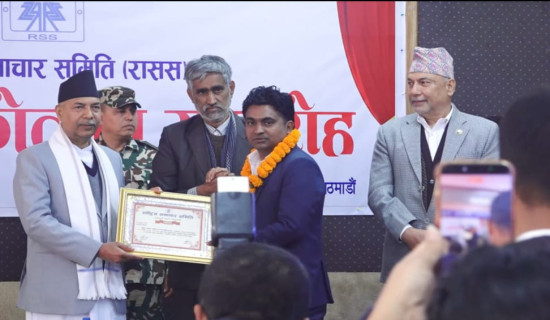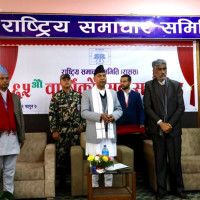- Friday, 20 February 2026
Republican Rhetoric And Reality
Economic revolution was a buzzword around the time the country was declared a republic. The political leaders, while exhorting the people for a republican setup, pledged that an economic revolution would emerge after the political revolution. The Declaration of the Republic was indeed a political revolution, and no doubt, the republican setup is the best form of polity that human civilisation has invented so far. 16 years have slipped since the country was declared a Federal Democratic Republic on May 28, 2008, by abolishing the 240-year-old monarchy through an elected Constituent Assembly. However, there are no signs of an economic revolution. The political parties and leaders that galvanised their forces to establish a new governing system have failed to translate the rhetoric into reality.
Consumer country
For common people, the economic revolution meant jobs. They expected the parties would focus on the economic issues of the country, particularly on creating jobs by means of establishing industries. But the situation has not changed much. The country has become more import-dependent and a consumer country. A widening trade deficit has been ringing the alarm. We are exporting the human labour force and importing goods and services. And this is a painful situation.
It does not mean there has been no progress. There has been, but the pace is frustratingly sluggish. Let’s check some data. According to the Industrial Statistics of the Department of Industry, there were 3,958 industries registered in 2008/09 in Nepal, employing 380,731 people. In 2022/23, the number of registered industries increased to 9,085; the number of employed also went up to 680,327. This data shows that the number of industries more than doubled from 2008 to 2023, whereas the number of jobs did not.
According to the National Industrial Survey conducted in 2018 but made public in April last year, there were 60,185 industrial institutions in Nepal. About 500,000 Nepalis are involved in these industries. Among these industries, there are 56,611 in the industrial production sector in Nepal. Among them, there are 5,017 large industries and 51,594 small industries.
According to a World Bank report, unemployment was 10.7 per cent in 2008, and it increased to 11 per cent in 2023 after hitting a peak of 13 per cent in 2020.
According to the Nepal Labour Force Survey 2017/18, there were approximately 20.7 million people of working age, and approximately 7.1 million were employed, while 908 thousand were unemployed. The remaining 4 million may have been partially employed. And the survey estimated that the unemployment rate was 11.4 per cent in 2018.
The survey showed agriculture was the biggest employing sector. One in every five people who had jobs in Nepal was employed in agriculture. Of the total employed, 17.5 per cent were engaged in the trade industry, while 13.8 per cent were in construction. Almost a quarter of the employed (23.8 per cent) were in service and sales occupations, while over 20 per cent were employed in elementary occupations.
The interesting point in the survey is that 69.1 per cent unemployed people in Nepal are in the age group of 16–34. In the year 2018, there were approximately 908 thousand Nepalis actively looking for work (unemployed), and of them, 38.1 per cent were young people aged 16–24 years.
These data from different institutions make it clear that a large number of young people are unemployed. They are seeking jobs. But they are not finding any. The rate of unemployment has not progressed much since the Republican declaration; it has remained about 11 per cent for the last one and a half decades. This is the crux of increasing disenchantment with the traditional or established political parties, which has alternatively enlarged the base of pro-monarchy forces.
Aspirations and frustration seem to be two sides of the same coin. When aspirations are not met, frustration is the result. People had high aspirations during the time of the declaration of the republic. The aspiration was also fueled by the leaders’ commitment to lead the country towards prosperity. But the commitment is yet to materialise, and the people, particularly the young generation, are looking for new political forces or parties that can do better. This was expressed in the parliamentary election held two years ago.
Work harder
When the incumbent government was formed two years ago, the prevailing narrative was that the country would go bankrupt soon. Some even argued that Nepal would face a financial crisis similar to that of Sri Lanka. Then, the foreign currency reserve was very low. This has changed now. The government led by Prime Minister Pushpa Kamal Dahal ‘Prachanda’ has done a good job. There are no such rumours now. The foreign exchange reserve has doubled in the last two years. This has implications for investment, including foreign direct investment, which can result in job creation.
The slogan of good governance, social justice, and prosperity, as upheld by the present government, has paid off to some extent. There has been some progress in good governance, which is a prerequisite for prosperity. But there is a lot more to do for social justice. The way victims of microfinance and cooperatives have hit the streets in the last few months has tore the cover of our economic system and political commitment. Evidently, both microfinance and cooperatives are meant to help the poor by collecting and distributing funds. But, instead of helping, it is now clear that most of them were engaged in exploitation. It is to be noted that as long as the interest rate in banks remains double-digit, no industrialization can take place. So these are the challenges the present government should solve to create a good environment for job creation through industrialization.
The Republic has institutionalised the idea that no one is great by birth. A man is the creator of his own destiny. Man or woman creates their destiny by means of labour or work. And the state, as the guardian, should ensure that every citizen willing to work gets a decent job and thus fulfils his or her destiny. As the leader who championed the republic the most, PM Prachanda has greater responsibility to work harder to make the republic meaningful for the common people. The Republic was not achieved so easily; thousands lost their lives in the struggle, particularly in the People’s War initiated by the Maoist Party. We have a republic today, mainly because of the People’s War. The whereabouts of many of those who were made to disappear during the fight for the republic are yet to be established. As we mark Republic Day, we must remember the loss and the aspirations shared during that time and reinvigorate the commitment to a better condition for all.
(Tiwari is a sub-editor of this daily and the coordinator of its online edition, risingnepaldaily.com.)















